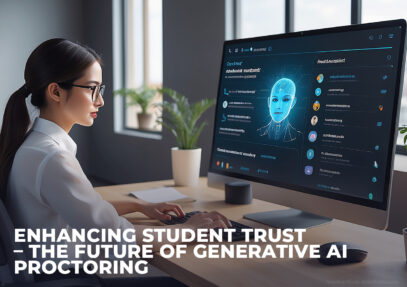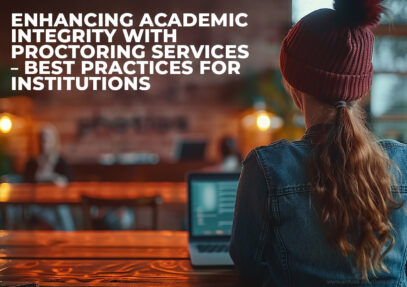
In today’s digital age, the landscape of education has evolved dramatically, with online learning becoming more prevalent than ever before. While this shift offers unprecedented accessibility and flexibility, it also presents challenges, particularly in maintaining academic integrity during remote assessments.
Fortunately, the rise of online proctoring solutions has provided institutions with a powerful tool to uphold academic honesty and ensure the credibility of online exams. Online proctoring, also known as remote exam proctoring, leverages advanced technology to monitor and invigilate exams conducted remotely.
These academic integrity tools utilize a variety of methods, including video monitoring, screen recording, and AI-based algorithms, to detect and deter cheating behavior effectively. By simulating the oversight provided in traditional exam settings, proctoring software for exams offers a secure and reliable means of conducting assessments in virtual environments.
For institutions seeking to implement online proctoring solutions, it is essential to adhere to best practices to maximize effectiveness and minimize disruptions.
Here are some key guidelines to consider:
1. Clear Communication
Before implementing remote proctoring, institutions should communicate transparently with students about the purpose and procedures involved. Providing clear guidelines and expectations regarding the use of proctoring software can help alleviate concerns and foster trust among students.
2. Flexible Options
Recognizing the diverse needs and circumstances of students, institutions should offer flexible options for remote proctoring. This may include accommodating different time zones, providing alternative assessment formats, or allowing for accommodations for students with disabilities.
3. Secure Technology
When selecting a proctoring solution, prioritize security and reliability. Look for virtual proctoring platforms that utilize encryption, multi-factor authentication, and other robust security measures to safeguard exam integrity and protect student data.
4. Training And Support
Ensure that both faculty members and students receive comprehensive training and support in using online proctoring tools effectively. This may involve providing tutorials, workshops, or access to technical assistance to address any questions or concerns that may arise.
5. Regular Evaluation
Continuously assess the effectiveness of remote proctoring practices and make adjustments as needed. Solicit feedback from students and faculty to identify areas for improvement and refine proctoring guidelines accordingly.
One exemplary provider of online proctoring solutions is EnFuse Solutions India, a leading provider of AI-based proctoring services. With their innovative approach and cutting-edge technology, EnFuse Solutions India offers secure exam proctoring solutions tailored to the unique needs of educational institutions.
By following these best practices and leveraging the capabilities of reputable proctoring services such as EnFuse Solutions India, institutions can enhance academic integrity and uphold the credibility of online assessments. With the right tools and strategies in place, remote proctoring can empower educators to maintain rigorous standards of academic honesty while embracing the flexibility and accessibility of online learning.
Conclusion
The adoption of online proctoring solutions represents a proactive step toward enhancing academic integrity in the digital era. By prioritizing clear communication, flexibility, security, training, and evaluation, institutions can effectively leverage proctoring services to uphold the credibility of online exams and ensure the integrity of the educational experience. With the support of trusted providers like EnFuse Solutions India, educators can embrace the potential of online learning with confidence and integrity.

















Comment